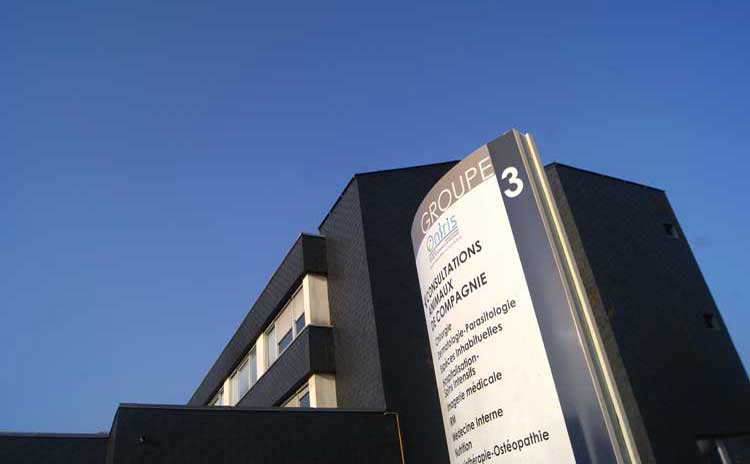About Oniris University Veterinary Hospital
The Centre Hospitalier Universitaire Vétérinaire (CHUV) d'Oniris is a cutting-edge university facility in which the veterinary students of tomorrow are involved.
The CHUV boasts a unique technical platform with surgical, anesthesia and medical imaging equipment, including high-performance digital radiology, ultrasound (including echocardiography), scintigraphy and Magnetic Resonance Imaging (MRI).
The CHUV offers an emergency department with a hospitalization and intensive care sector for pets and equines.
How CHUV works
The Centre Hospitalier Universitaire Vétérinaire is a teaching aid for veterinary students at the Nantes - Oniris veterinary school. This is why, in the care departments, you will be welcomed by 5th and 6th year veterinary students who will carry out an initial assessment of your animal. You will then be seen by a veterinary doctor, the department's clinician, who will examine your pet and be solely responsible for diagnostic and therapeutic proposals. If your pet is hospitalized, the 5th and 6th year veterinary students will continue the care and management of your pet, 24 hours a day, 7 days a week, always under the supervision of the department's experienced veterinarians./p>
All CHUV departments work in close collaboration with each other. Some complex or multidisciplinary cases may require the intervention of several departments. The CHUV boasts a high-level technical platform, notably in the fields of medical imaging, interventional endoscopy, laparoscopic surgery and intensive care.
Click on the button below to consult the general operating conditions of the veterinary care establishment:
Billing
Consultations and procedures carried out at the veterinary school are subject to a charge. A checkbook is required. Fees are comparable to those charged by other veterinary establishments.
No expensive procedures are carried out without prior agreement. An estimate of costs is given at the end of each consultation, before any further examination or hospitalization./p>
If the animal is hospitalized, a deposit cheque corresponding to the estimate is requested; this will not be cashed and will be returned after payment of the final invoice.
Payment is due in full on discharge. Requests for payment facilities must be made during opening hours to the reception area.
About veterinary specialists
What is a veterinary specialist?
After completing the general curriculum and obtaining the title of Doctor of Veterinary Medicine, a veterinarian can follow a specific 3-year training course to acquire special skills in a particular field.
The specialist's diploma is awarded on completion of this training and a demanding examination. For the veterinarian who obtains it, the diploma attests to a recognized and rare competence in the field of specialization.
The two types of specialization officially recognized in France today are :
- The French veterinary specialization diploma (DESV or Diplôme d'Etude Spécialisée Vétérinaire). A list of French veterinary specialists is available on the AVSF (Association des Vétérinaires Spécialistes Français) website.
- The European Specialization Diploma. Often referred to as a “Board”. European veterinary specialists are listed on the EBVS (European Board of Veterinary Specialisation) website. The European specialist title is the only title to be recognized internationally.
Some areas of specialization are not yet recognized in France and Europe. That's why there are also veterinary specialists who have graduated from an American college.

